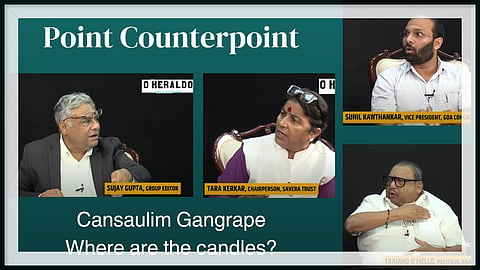

The discussion hosted by Sujay Gupta, Group Editor of Herald Publications, in Show Point Counterpoint, addresses a brutal gang rape in Goa, exposing failures in law enforcement and public response. Despite arrests, key concerns remain: lack of police intervention, unchecked guest houses, and civil society’s silence. Experts highlight rising crime in coastal areas, linking it to unregulated tourism, political patronage, and non-Goan dominance in the hospitality sector. They call for stronger policing, public protests, stricter tourism regulations, and severe punishments for criminals.
1. Tara Kerkar - Chairperson, Savera Trust
2. Sunil Kavthankar - Vice President, Goa Congress
3. Trajano D'mello - Political Analyst
A woman was repeatedly assaulted by five men in a guest house before being dumped on the highway. A passerby alerted authorities, leading to her rescue. While arrests have been made, fundamental concerns remain:
Sujay Gupta: Why is there no public outcry over this heinous crime? In the past, incidents like the Nirbhaya case saw massive protests. Why is Goa silent?
Tara Kerkar: There is an alarming silence from civil society, opposition parties, and institutions like the Women’s Commission. Opposition leaders have wives, sisters, and mothers—why are they not speaking out? Where are the candlelight marches? It is deeply concerning that we are not seeing the level of public outrage such a crime deserves.
Sunil Kavthankar: While statements have been issued, I admit that opposition leaders and civil society have failed to mobilize street protests. Giving lip service is not enough. Political parties have a responsibility to raise public concerns. The shocking aspect is that these crimes are happening in heavily populated areas, yet no one intervenes.
Trajano D’Mello: The reality is that there is no law, no order—just total disorder. People are afraid to even visit certain parts of Goa, including major tourist destinations like Calangute. When politicians protect criminals, law enforcement becomes ineffective.
Sujay Gupta: The crime itself is horrifying, but what about the lapses in the system? The incident occurred over several hours. Where was the police patrol? Why was no one suspicious of five men taking a mentally challenged woman into a guest house?
Sunil Kavthankar: This crime exposes the failure of policing. Goa police have a Pink Force, meant to protect women. Where were they? Why was there no intervention? The guest house where the crime occurred should have been immediately sealed, and the owner held accountable. But merely canceling a license is a knee-jerk reaction that won’t hold up in court.
Trajano D’Mello: This isn’t just a failure of policing; it’s a symptom of deeper issues. The tourism industry in North Goa is rife with illegalities, backed by political leaders. When an MLA publicly defends illegal operators and prevents authorities from acting, what message does that send? Criminals believe they can get away with anything.
The recent rape case is part of a larger pattern of violence and lawlessness in Goa’s coastal areas. Some of the incidents that highlight this disturbing trend include:
Murder of Amar Bhandari in Arambol: A local activist who tried to remove illegal beach chairs was attacked and later died of a heart attack.
Tourists assaulted at Kenwood Shack: Visitors were attacked by shack workers, many of whom are non-Goan migrants.
Goan veterinarian attacked at Candolim Shack: The victim was reportedly drunk, but physical violence is unacceptable.
Crime Branch officer assaulted in North Goa: Even police officers are not safe, with local police stations refusing to file complaints.
Sujay Gupta: Shacks were once symbols of Goan hospitality, but today, they are increasingly seen as crime hubs. Why is this happening?
Sunil Kavthankar: Earlier, shacks were run by Goan families, offering a safe and welcoming space. Today, most are run by non-Goans, and we are seeing an increase in violence, drugs, and prostitution. In the last two months alone, three murders have occurred in beach shacks. This is a dangerous trend.
Tara Kerkar: The hospitality industry in North Goa is no longer benefiting locals. The shack owners, workers, and even room operators are mostly outsiders. Meanwhile, locals bear the burden of strained resources like water, electricity, and waste disposal.
Trajano D’Mello: The authorities’ failure to regulate the industry has turned beaches into hotspots for illegal activities. The issue isn’t just violence—it’s the systematic erosion of Goa’s identity. Lawmakers who shield criminal elements are responsible for this mess.
The discussions highlight several urgent steps that must be taken:
1. Police Accountability: Investigations into crimes must be thorough, and systemic failures must be addressed. The officers who fail to enforce the law must be held accountable.
2. Civil Society Mobilization: There must be greater public engagement. Protests and awareness campaigns are needed to demand justice.
3. Regulation of the Tourism Sector: The government must ensure that only licensed Goans run shacks and tourism-related businesses. Illegal operators must be removed.
4. Strictest Punishments for Crimes Against Women: The gang-rape perpetrators must receive the harshest possible punishment under the law, including the death penalty if applicable.
5. End Political Patronage of Criminals: MLAs and ministers who shield criminals must be exposed and removed from power.
Goa is at a crossroads. Once a safe, welcoming paradise, it is now witnessing an alarming rise in crime and lawlessness. This cannot continue. Political leaders, law enforcement, and civil society must come together to restore order and justice. Silence is no longer an option.